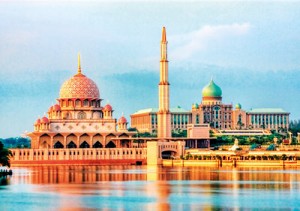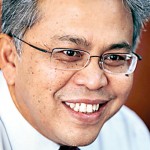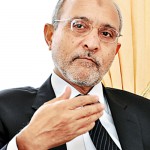Holy month back home
This is a tale of three Ramadans. Even as you read this, Muslims around the world have begun preparations for the final week of Ramadan.
The religious fulcrum of Ramadan remains the same all over the world – Muslims who observe the fast, refrain from food and drink from sunrise to sunset and are expected to curb their desires, engage in self-reflection and practise compassion and charity. Ramadan is considered a time to renew one’s spirituality – to undertake a spiritual audit, if you will – and the month culminates in Eid-ul-Fitr festivities.

A time for prayer:The Putra mosque in Malaysia
First, we turn towards East Asia for a glimpse of Ramadan in Malaysia. With a population of 28 million, the strands of Asia’s oldest civilisations – Malay, Chinese and Indian – are woven into Malaysia’s social tapestry. High Commissioner of Malaysia in Sri Lanka, Azmi Zainuddin, highlights the importance given to family during this month and describes the festive atmosphere of Malaysia’s Ramadan bazaars.
During Ramadan special permits are issued by the city and municipal councils for Ramadan Bazaars to take place. Describing it as a celebratory atmosphere filled with traditional foods usually consumed for ifthar, Azmi explains that these neighbourhood bazaars are a magnet for all communities – pockets of people weave their way through the vendors, partaking in traditional Malay foods. Beginning at about four in the evening, they continue till eight and as night descends, the bazaars wind down and the mosques fill up.

Turkish Ambassador Iskender Okyay
In the mosques, people, corporates and hotels contribute towards ifthars which are open to anyone to break their fast and congregate later for prayers. All mosques, Azmi highlights, offer praying facilities for men and women and remain open long after breaking fast for the congregation for Taraweeh prayers.
Like in Sri Lanka, a wholesome and filling kanji presides over the ifthar table along with Malay cakes and savouries such as Murtabak (dough envelopes filled with meat) and noodles. For the morning Sahar meal consumed before beginning the fast, rice, bread and porridge are staple fare. For Eid celebrations, Azmi explains that ketupat (rice cakes cooked in woven coconut leaves) are a favourite along with the traditional sweets and eats.

Malaysian High Commissioner Azmi Zainuddin
The month of fasting culminates with a month of fellowship in Malaysia. Families open up their homes and lay out a table of eats for anyone who visits – a quintessential example of Malay hospitality. The open houses in the village and rural areas are animated affairs with friends and relatives popping in. The open houses in the city, by contrast, are more inclined to be by invitation.
A sense of homecoming inevitably cloaks Eid festivities. “One thing about Eid is that it is the time when the families will gather. It is tradition during Eid that we always go back to the family,” explains Azmi. Having served in Zimbabwe, Italy, Egypt, Netherlands and now Sri Lanka, what does Azmi miss the most about Eid in Malaysia? “Only my family,” he smiles, adding that he was excited to see his children who will be joining him in Sri Lanka for Eid celebrations.
Meanwhile in Pakistan, there is a tectonic shift in the country’s social plates during the month of Ramadan. For most countries, political narratives tend to subsume its cultural stories and Pakistan is a textbook example of this cultural conundrum. Maj. Gen (Retired) Syed Shakeel Hussain, the High Commissioner of Pakistan sat down with the Sunday Times to describe the daily life of people, family

Pakistan High Commissioner Syed Shakeel Hussain
routines, food patterns and market forces during the month of Ramadan.
In the early hours of the morning, siren calls and loudspeakers have replaced the drum beaters of olden Pakistan (although some villages continue this tradition) to announce the time to begin and finish eating for sehri – or sahar, as known in Sri Lanka. On TV, religious programmes pervade the airwaves. On the streets, there is a lot more manpower to produce and distribute large amounts of food. Hundreds of vendors folding triangles of dough and churning out crisp samosas, frying piping hot pakoras and squeezing mini mountains of fruit to make pitchers of juice are a common phenomenon. The rush begins at about 5 in the evening and slowly evaporates as the sun sets, with both customers and vendors heading home to break their fast with their families.
“Human beings, by nature, work on reminders. This is our instinct. So Ramadan also comes as a reminder, year after year – it reminds you how you are supposed to live and how you are supposed to worship,” muses Shakeel, adding that Ramadan provides a yearly impetus to reflect and renew one’s spirituality. The financial instruments for sharing wealth with the less privileged such as zakat, sadaqaat, Fitrana etc become more active during this month. Pakistan’s climate oscillates between harsh summers and bitter winters and it hasn’t been an easy Ramadan for Pakistan this year. The deadly heat wave which gripped Karachi – claimed 1200 lives and cast a pall over the month. Shakeel describes the situation as “very tragic and extremely unfortunate reflection of how changing climatic patterns and global warming can take its toll,” adding that civil society galvanised itself, establishing camps once the direness of the situation was realised.
Arriving in Colombo two months ago, Sri Lanka is the High Commissioner’s first diplomatic posting. Describing his own experiences of Ramadan while growing up, he speaks of the gentle initiation into fasting as a boy of seven or eight and childhood habits now imbibed into adult routine. On the day before Eid, while his mother attended to the food for Eid celebrations (no mean feat), Shakeel reminiscences with evident nostalgia, how his father would make sure that their clothes were meticulously pressed and placed on a levelled surface to be wrinkle-free the next day. Eidi, gifts given during Eid, is eagerly awaited by the young in all families – usually offerings of crisp, new notes withdrawn especially for Eid.
As Ramadan draws to a close, the sighting of the moon becomes a social activity, with Chaand Raat parties mushrooming across towns. Chaand Raat is primarily a women-centric event which starts with the sighting of the moon and features dholak, singing, applying Mehendi and wearing colourful glass bangles. All over the country, the kitchens hum with activity in preparation for the food festivities the next day. With influences from South and Central Asia, Pakistani food during Ramadan is a delectable affair and the full flavours of Pakistan’s palate are on display on the Eid table.
When a banner made out of twinkling lights is strung between the minarets of the mosques which dot the country, the people of Turkey know that Ramadan has truly arrived. The banner, bearing a message which wishes everyone a happy Ramadan, is hoisted to mark the beginning of fasting and remains there throughout the month.
Turkey wears the month of Ramadan with an air of spirituality and colourful festivity. “More than a kind of religious atmosphere, it [Ramadan] is like a feast in Turkey – it is a happy time,” explains Iskender Okyay, the first Ambassador of Turkey to Sri Lanka. Shadow puppet theatres are set up in public areas for children’s entertainment, usually in a market place depending on the weather. These Turkish shadow puppets (Karagoz) are lingering cultural remnants of the Ottoman Empire, where shows by candle light would be staged. Turkey has been constantly referred to as a bridge connecting the East and the West and thanks to its geo-political location, the Turks are generally tradespeople. Bustling markets are a norm but during Ramadan, the atmosphere quietens.
Before the advent of watches and clocks, the old fashioned tradition of drum players wandering through streets before dawn, waking people for Sahar was a familiar sight in Turkey. For those who have a nostalgic yearning for the traditions of Ramadan lost in the midst of modernity, there are the old faithfuls in pockets of Turkey who still carry out the tradition.
As dates have to be imported and olives are more freely available, the Turkish tradition is to break fast with water and olives. Ifthar is a long drawn affair which continues till night – “We Turks are long eaters and we have long dinners, this is even longer than normal,” Iskender smiles wryly. Original Turkish cuisine is more vegetarian centric with a lot of olive oil based dishes – the meat dishes are results of influences of South Eastern, Middle Eastern and Balkan cuisine. While the food differs regionally, a typical ifthar table usually constitutes traditional Turkish dishes along with perennial Turkish sweets such Baklava and Turkish Delight. Eid-ul-Fitr is known as ‘Ramazan Bayrami’ or ‘Seker Bayrami’ in Turkish and revolves around Eid prayers, family time, charity and gathering together to enjoy a large meal.
On paper, Turkey is said to have a Muslim population of 97% but it is difficult to get a clean cut, cohesive picture of the population simply by this statistic. Turkey is a secular republic where Islam has been accepted by a majority as a religion and also has a small Christian and Jewish minority. Within the population of Muslims, there is the Alevi sect – derived from the Shiite religious group but is a different type of Shiism from the Iranian practice – and within Alevism, is the Bektashi sect. “All these people have different cultural backgrounds and different approaches to religion. In Ramazan also, these differences come together but in a peaceful and a harmonious way,” smiles Iskender.


